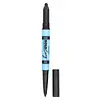What's inside
What's inside
 Key Ingredients
Key Ingredients

 Benefits
Benefits

 Concerns
Concerns

 Ingredients Side-by-side
Ingredients Side-by-side

Trimethylsiloxysilicate
EmollientIsododecane
EmollientCyclopentasiloxane
EmollientSynthetic Wax
AbrasiveSilica
AbrasivePolyisobutene
Mica
Cosmetic ColorantTocopheryl Acetate
AntioxidantSilica Dimethyl Silylate
EmollientPolyhydroxystearic Acid
EmulsifyingCopernicia Cerifera Cera
EmollientCI 77499
Cosmetic ColorantSynthetic Fluorphlogopite
Diisostearyl Malate
EmollientCaprylyl Methicone
Skin ConditioningCaprylic/Capric Triglyceride
MaskingMicrocrystalline Wax
Emulsion StabilisingDisteardimonium Hectorite
StabilisingLauroyl Lysine
Skin ConditioningPropylene Carbonate
SolventBHT
AntioxidantTrimethylsiloxysilicate, Isododecane, Cyclopentasiloxane, Synthetic Wax, Silica, Polyisobutene, Mica, Tocopheryl Acetate, Silica Dimethyl Silylate, Polyhydroxystearic Acid, Copernicia Cerifera Cera, CI 77499, Synthetic Fluorphlogopite, Diisostearyl Malate, Caprylyl Methicone, Caprylic/Capric Triglyceride, Microcrystalline Wax, Disteardimonium Hectorite, Lauroyl Lysine, Propylene Carbonate, BHT
Silica
AbrasiveMethyl Trimethicone
Skin ConditioningTrimethylsiloxysilicate
EmollientDipentaerythrityl Pentaisostearate
EmollientCeresin
Emulsion StabilisingSynthetic Wax
AbrasiveMicrocrystalline Wax
Emulsion StabilisingTitanium/Titanium Dioxide
Cosmetic ColorantOctyldodecanol
EmollientGlyceryl Behenate
EmollientPolyglyceryl-6 Octastearate
EmulsifyingTocopheryl Acetate
AntioxidantCaprylyl Methicone
Skin ConditioningCaprylic/Capric Triglyceride
MaskingDisteardimonium Hectorite
StabilisingPropylene Carbonate
SolventCI 77000
Cosmetic ColorantSilica, Methyl Trimethicone, Trimethylsiloxysilicate, Dipentaerythrityl Pentaisostearate, Ceresin, Synthetic Wax, Microcrystalline Wax, Titanium/Titanium Dioxide, Octyldodecanol, Glyceryl Behenate, Polyglyceryl-6 Octastearate, Tocopheryl Acetate, Caprylyl Methicone, Caprylic/Capric Triglyceride, Disteardimonium Hectorite, Propylene Carbonate, CI 77000
Ingredients Explained
These ingredients are found in both products.
Ingredients higher up in an ingredient list are typically present in a larger amount.
This ingredient is an emollient, solvent, and texture enhancer. It is considered a skin-softener by helping the skin prevent moisture loss.
It helps thicken a product's formula and makes it easier to spread by dissolving clumping compounds.
Caprylic Triglyceride is made by combining glycerin with coconut oil, forming a clear liquid.
While there is an assumption Caprylic Triglyceride can clog pores due to it being derived from coconut oil, there is no research supporting this.
Learn more about Caprylic/Capric TriglycerideCaprylyl Methicone is a type of silicone.
It helps soften and soothe the skin by creating a thin film on top. This film helps trap moisture, keeping your skin hydrated.
Disteardimonium Hectorite comes from the clay mineral named hectorite. It is used to add thickness to a product.
It can also help stabilize a product by helping to disperse other ingredients.
Hectorite is a rare, white clay mineral.
Learn more about Disteardimonium HectoriteMicrocrystalline Wax is created by de-oiling petroleum. It is highly refined and purified before being added to cosmetics.
Microcrystalline Wax is used to enhance the texture and create even consistency. It helps stabilize a product by preventing ingredients from separating.
This ingredient is a solvent. It helps dissolve active ingredients and alter the texture of products.
Propylene Carbonate is commonly used in makeup and with clay, such as montmorillonite or bentonite.
Studies show this ingredient to be safe for cosmetics. When it is undiluted, it can cause skin irritation. (It is always diluted in skincare and makeup). This ingredient is water-soluble.
Propylene Carbonate is created from propylene glycol and carbonic acid.
Learn more about Propylene CarbonateSilica, also known as silicon dioxide, is a naturally occurring mineral. It is used as a fine, spherical, and porous powder in cosmetics.
Though it has exfoliant properties, the function of silica varies depending on the product.
The unique structure of silica enhances the spreadability and adds smoothness, making it a great texture enhancer.
It is also used as an active carrier, emulsifier, and mattifier due to its ability to absorb excess oil.
In some products, tiny microneedles called spicules are made from silica or hydrolyzed sponge. When you rub them in, they lightly polish away dead skin layers and enhance the penetration of active ingredients.
Learn more about SilicaSynthetic Wax is created from fossil fuels such as natural gas. It is used to enhance texture, adjust pH, and as an occlusive.
It may also be used as an abrasive ingredient to exfoliate the skin.
Synthetic Wax may not be fungal acne safe.
Learn more about Synthetic WaxTocopheryl Acetate is AKA Vitamin E. It is an antioxidant and protects your skin from free radicals. Free radicals damage the skin by breaking down collagen.
One study found using Tocopheryl Acetate with Vitamin C decreased the number of sunburned cells.
Tocopheryl Acetate is commonly found in both skincare and dietary supplements.
Learn more about Tocopheryl AcetateThis silicone is an emollient. Emollients create a thin film on the skin to prevent moisture from escaping.
It is not soluble in water and helps increase water-resistance in products.
According to a manufacturer, it can blend seamlessly with silicone oils, such as Cyclopentasiloxane.
Learn more about Trimethylsiloxysilicate